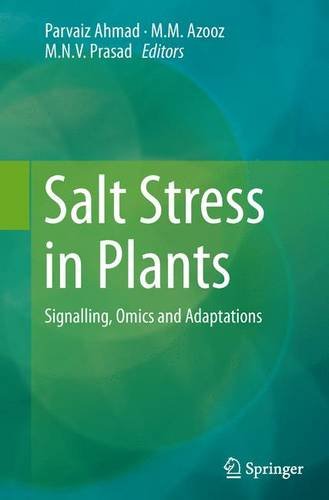
Salt Stress in Plants:Signalling, Omics and Adaptations
生物工程售 价:
¥
2335.00
发货周期:外国库房发货,通常付款后3-5周到货
出 版 社
出版时间
2015年03月06日
装 帧
平装
页 码
509
开 本
9.21 x 6.14 x 1.06
语 种
英文
综合评分
暂无评分
- 图书详情
- 目次
- 买家须知
- 书评(0)
- 权威书评(0)
图书简介
Environmental conditions and changes, irrespective of source, cause a variety of stresses, one of the most prevalent of which is salt stress. Excess amount of salt in the soil adversely affects plant growth and development, and impairs production. Nearly 20% of the world’s cultivated area and nearly half of the world’s irrigated lands are affected by salinity. Processes such as seed germination, seedling growth and vigour, vegetative growth, flowering and fruit set are adversely affected by high salt concentration, ultimately causing diminished economic yield and also quality of produce. Most plants cannot tolerate salt-stress. High salt concentrations decrease the osmotic potential of soil solution, creating a water stress in plants and severe ion toxicity. The interactions of salts with mineral nutrition may result in nutrient imbalances and deficiencies. The consequence of all these can ultimately lead to plant death as a result of growth arrest and molecular damage. To achieve salt-tolerance, the foremost task is either to prevent or alleviate the damage, or to re-establish homeostatic conditions in the new stressful environment. Barring a few exceptions, the conventional breeding techniques have been unsuccessful in transferring the salt-tolerance trait to the target species. A host of genes encoding different structural and regulatory proteins have been used over the past 5–6 years for the development of a range of abiotic stress-tolerant plants. It has been shown that using regulatory genes is a more effective approach for developing stress-tolerant plants. Thus, understanding the molecular basis will be helpful in developing selection strategies for improving salinity tolerance. This book will shed light on the effect of salt stress on plants development, proteomics, genomics, genetic engineering, and plant adaptations, among other topics. The book will cover around 25 chapters with contributors from all over the world. ??
本书暂无推荐
本书暂无推荐















